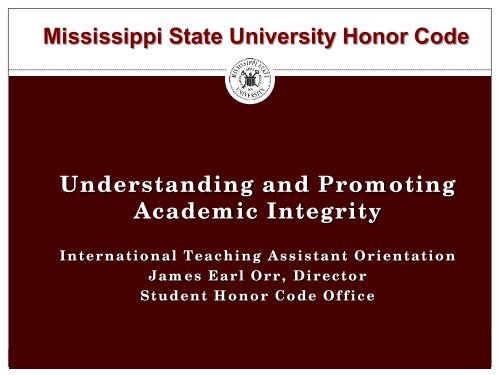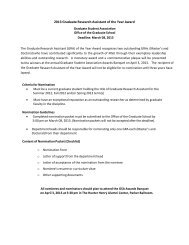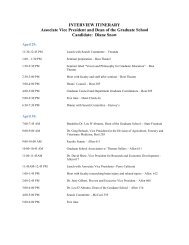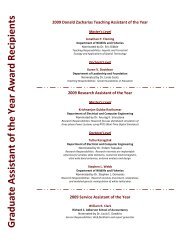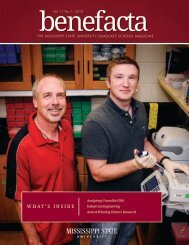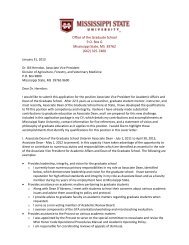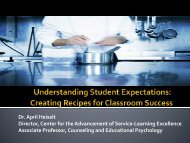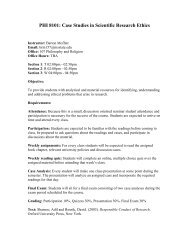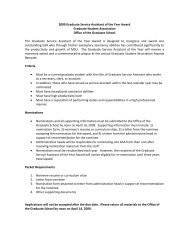Honor Code - Mississippi State University
Honor Code - Mississippi State University
Honor Code - Mississippi State University
- No tags were found...
Create successful ePaper yourself
Turn your PDF publications into a flip-book with our unique Google optimized e-Paper software.
<strong>Mississippi</strong> <strong>State</strong> <strong>University</strong> <strong>Honor</strong> <strong>Code</strong>Understanding and PromotingAcademic IntegrityInternational Teaching Assistant OrientationJames Earl Orr, DirectorStudent <strong>Honor</strong> <strong>Code</strong> Office
Agenda Importance of Academic Integrity Understanding the Culture What Constitutes a Violation of the Student<strong>Honor</strong> <strong>Code</strong> Tips For Avoiding Academic Misconduct Student <strong>Honor</strong> <strong>Code</strong> Process Conclusion
Why This Presentation is Important Understanding of the Student <strong>Honor</strong> <strong>Code</strong> Avoidance of Violating the Student <strong>Honor</strong><strong>Code</strong> Promotion of Academic Integrity
Classification24% -Freshman19%- Sophomore18% - Junior27% - Senior12% - GraduateNote: Seniors make up about 27% of the total student body
Academic Misconduct Plagiarism Cheating Fabrication Falsification Multiple Submissions Complicity Violation of Departmental or College Rules
Plagiarism As Defined by the MSU Student <strong>Honor</strong><strong>Code</strong>: “The appropriation of another person's ideas,processes, results, or words without givingappropriate credit” (p. 4). 55% of all reported cases involvedplagiarism.
Plagiarism Cont. Intentionally, knowingly, or carelesslypresenting the work of another as one’sown. Does this mean that if it is done by a mistake,that it is excusable? No, it doesn’t (carelessly). Failing to credit sources used in a workproduct in an attempt to pass off thework as one’s own.
Important Plagiarism Related Terminology Citations Common Knowledge Paraphrase Direct Quotations
Citation Know your discipline’s citation guideIt is important to cite, but it must be done correctly.Ex. American Psychological Association (APA) styleand Modern Languages Association (MLA) style Footnotes, endnotes, and in-text citationsOne footnote, endnote, or in-text citation is usuallyenough to acknowledge indebtedness when anumber of connected sentences are drawn from onesource. Works Cited Page/Reference Page
Common Knowledge Common knowledgeGenerally known facts such as the names of leadersof prominent nations, basic scientific laws, etc. Common knowledge does not have to becitedBarack Obama is the President of the United <strong>State</strong>s. May vary according to disciplineIf unsure, cite!
ParaphraseParaphraseParaphrase is a restatement of someone else's ideas orobservations in your own words.Give Immediate AcknowledgementDo not simply rearrange wordsRead what you plan to paraphrase. Then write thatinformation without looking at the text.Compare this to the original text. Be sure you have notused the same phrases or words. It is also important tomake sure the information is correct.
Direct Quotation Direct QuotationDirectly writing the words or quoting thewords of another. Use Quotations or Appropriate Indention Acknowledge In the Texti.e. in text citation, footnote or endnote
Direct Quotation Cont. Ex. Using Modern Language AssociationAccording to Peter S. Pritchard in USAToday, “Public schools need reform butthey’re irreplaceable in teaching all thenation’s young” (14).
Plagiarism Practice Directions I will post a phrase for you to read. I will then post the text of someone usingthe information from the phrase. I will ask you to write whether the phraseis acceptable or unacceptable. I will show whether the phrase wasacceptable or unacceptable on the screenand ask someone with the correctresponse to discuss.
Example 1• This is the original text from the ASCA Law and Policy Report byGary Pavela:A good way to remind students about the importance of academicintegrity is to introduce them to ethical standards in the subject they'restudying. Ask them to read and critique those standards— and discusswhether any standards are necessary. Making such an effort suggeststo students that honesty and integrity are core components of mostcareers or professions, not an obscure idiosyncrasy of academic life.Furthermore, students are often intensely interested in the values andbeliefs of their teachers. By discussing the ethics of their disciplines orprofessions, college professors send the powerful subliminal messagethat ethical inquiry and commitment can be a source of personalfulfillment.
Example 1: Student’s PaperA good way to remind students about theimportance of academic integrity is to introducethem to ethical standards in the subject they'restudying. Ask them to read and critique thosestandards— and discuss whether any standardsare necessary. Making such an effort suggests tostudents that honesty and integrity are corecomponents of most careers or professions, notan obscure idiosyncrasy of academic life (Pavela2009).
Acceptable or Unacceptable Unacceptable Why is this unacceptable?The student copied the authors words withoutusing direct quotations or paraphrasing. The student cited Pavela at the end oftheir sentence.This is still considered plagiarism because thestudent does not use direct quotations; thestudent cited improperly.
Example 2: Student’s PaperIt is essential to academic integrity foruniversities to remind students of theimportance of being ethical. Many tactics can beused to accomplish this goal. Garry Pavelawrites, “A good way to remind students aboutthe importance of academic integrity is tointroduce them to ethical standards in thesubject they're studying. Ask them to read andcritique those standards— and discuss whetherany standards are necessary” (2009).
Acceptable or Unacceptable Acceptable Why is this acceptable? The writer acknowledges that the wordsin quotation are those of Garry Pavelaby using quotations marks and placinga reference at the end of the sentence.
Example 3: Student’s PaperA good method to remind students aboutthe importance of academic honesty is tointroduce them to ethical standards in thesubject they are studying. It is importantask them to read and critique thosestandards— and discuss whether standardsare necessary. Making such an effortimplies to students that honesty andintegrity are core aspects of most careersor professions, not an obscure idiosyncrasyof academic life (Pavela 2009).
Acceptable or Unacceptable Unacceptable Why is this acceptable? The writer simply replaced words withother words. The writer did not use hisor her own words and phrases.
Example 4: Student’s PaperText, from page 1 of Lizzie Borden: A Case Book of Familyand Crime in the 1890s by Joyce Williams et al.:The rise of industry, the growth of cities, and the expansion ofthe population were the three great developments of latenineteenth century American history. As new, larger, steampoweredfactories became a feature of the Americanlandscape in the East, they transformed farm hands intoindustrial laborers, and provided jobs for a rising tide ofimmigrants. With industry came urbanization the growth oflarge cities (like Fall River, Massachusetts, where theBordens lived) which became the centers of production aswell as of commerce and trade.
Acceptable or Unacceptable?UnacceptableWhat makes this passage plagiarism?The student simply changed around some of the words and phrases.The student did not cite source.If you do either or both of these things, you areplagiarizing.NOTE: This paragraph is also problematic because itchanges the sense of several sentences (for example,"steam-driven companies" in sentence two misses theoriginal’s emphasis on factories).
Example 5: Student’s PaperText, from page 1 of Lizzie Borden: A Case Book of Familyand Crime in the 1890s by Joyce Williams et al.:The rise of industry, the growth of cities, and the expansion ofthe population were the three great developments of latenineteenth century American history. As new, larger, steampoweredfactories became a feature of the Americanlandscape in the East, they transformed farm hands intoindustrial laborers, and provided jobs for a rising tide ofimmigrants. With industry came urbanization the growth oflarge cities (like Fall River, Massachusetts, where theBordens lived) which became the centers of production aswell as of commerce and trade.
Example #5 Student’s PaperFall River, where the Borden family lived, was typical ofnortheastern industrial cities of the nineteenth century.As steam-powered production shifted labor fromagriculture to manufacturing, the demand for workers"transformed farm hands into industrial laborers," andcreated jobs for immigrants (Williams). In turn,growing populations increased the size of urban areas.Fall River was one of these hubs "which became thecenters of production as well as of commerce and trade"(Williams 1).
Acceptable or Unacceptable? Acceptable Why is this passage acceptable?This is acceptable paraphrasing because the writer: Records the information in the original passageaccurately. Gives credit for the ideas in this passage. Indicated which part is taken directly from thesource by putting the passage in quotationmarks and citing the page number.
Tips for Avoiding Plagiarism Use Quotation Marks when Quoting Paraphrase Cite Sources Do not Procrastinate Take Good Notes/Cite Sources in Notes
Campus Resources Professors MSU Writing Center 662-325-1045 Mitchell Memorial Library Center for Teaching and Learning Read Student <strong>Honor</strong> <strong>Code</strong> Newsletter Student <strong>Honor</strong> <strong>Code</strong> Office 2 nd Floor YMCA Building
Multiple Submissions As Defined by the MSU <strong>Honor</strong> <strong>Code</strong>: “The submission of substantial portions of thesame work (including oral reports) for creditmore than once without authorization fromthe instructor of the class for which thestudent submits the work” (p. 4). 1% of all reported cases involvedmultiple submissions.
Cheating As Defined by the MSU Student <strong>Honor</strong><strong>Code</strong>:“Intentionally using or attempting to useunauthorized materials, information, notes,study aids or other devices or materials in anyacademic exercise” (p. 3). 38% of all reported cases involvedcheating.
Complicity As Defined by the MSU <strong>Honor</strong> <strong>Code</strong>:“Intentionally or knowingly helping, orattempting to help, another to commit an actof academic dishonesty” (p. 5). 1% of all reported cases involvedcomplicity.
FabricationAs Defined by the MSU Student <strong>Honor</strong><strong>Code</strong>: “Making up data or results and recording orreporting them” (p. 3).1% of all reported cases involvedfabrication.
Falsification As Defined by the MSU <strong>Honor</strong> <strong>Code</strong>:“Manipulating research materials, equipment, orprocesses, or changing or omitting data or results suchthat the research or academic work is not accuratelyrepresented in the research or work record” (p. 4). 1% of all reported cases involvedfalsification.
Tips for Avoiding Academic MisconductUtilize Campus ResourcesAttend ClassParticipate in ClassDo Not ProcrastinateDaily Review NotesUnderstand Expectations of InstructorConsider the Process and Not Just the Results
Tips for Preventing Academic MisconductPromoting Academic Integrity inthe Classroom
Preventing Cheating Explain What Constitutes AcademicDishonesty: Do not Assume they Know!See Handout Require Submission of Student <strong>Honor</strong><strong>Code</strong> Pledge with Assignments Discuss Consequences for ViolatingStudent <strong>Honor</strong> <strong>Code</strong>
Preventing Cheating Require Student ID’s be Present DuringExaminations Student <strong>Honor</strong> <strong>Code</strong> ExaminationProctoring Program Walk Around Classroom DuringExamination Visit Student <strong>Honor</strong> <strong>Code</strong> Website:http://www.honorcode.msstate.edu/resources/
Handling Alleged ViolationsReporting and Hearing Process
Reporting Reporting Violations All members of the <strong>University</strong> community mayreport violations of the Student <strong>Honor</strong> <strong>Code</strong>. Reports may be made to an instructor, theStudent <strong>Honor</strong> <strong>Code</strong> Office or the appropriate<strong>University</strong> official. Reporting Process
Reporting Process Scenario (Discovery of Alleged Violation) Contact Student <strong>Honor</strong> <strong>Code</strong> Council Office If no previous violation, proceed with process Meet with Student (Ideally) Accept Responsibility “I acknowledge committing the violation of theStudent <strong>Honor</strong> <strong>Code</strong> and accept the sanction (s)assigned by the faculty member.”
Reporting Process Cont. Accept Responsibility “I acknowledge committing the violation of theStudent <strong>Honor</strong> <strong>Code</strong> but do not accept thesanction (s) assigned by the faculty member.”-Request hearing Do Not Accept Responsibility “I do not acknowledge violating the Student<strong>Honor</strong> <strong>Code</strong>.” – Request hearing
<strong>Honor</strong> <strong>Code</strong> Hearing Committee of 6 3 Voting Faculty Members 2 Voting Students Graduate Students Must Be Adjudicated By OtherGraduate Students 1 Non Voting ChairStudents may serve as chairperson
<strong>Honor</strong> <strong>Code</strong> Hearing Cont. Committee’s Responsibility: Decision (2Parts) The committee must decide if the student isresponsible for violating the Student <strong>Honor</strong><strong>Code</strong>. Is it more likely that the student violated the Student <strong>Honor</strong><strong>Code</strong> than not? This is based solely on the facts presented. If the student is responsible, the committeemust decide on a sanction Range: No Sanction to Expulsion What Occurs During A Hearing?
Sanctioning Guidelines Dismissal From <strong>University</strong> Lowered Course Grade May not withdraw from course while allegationsof academic dishonesty are pending. Zero on Assignment Academic Integrity Intervention Program Library Seminar and Online Ethics Course XF X represents academic dishonesty
<strong>Honor</strong> <strong>Code</strong> Sanctions: 2007-2011Sanction Sanction Total Total Percent PercentZero 0 on on assignment 242 306 41% 36%XF XF sanction 159 215 27% 25%Grade Grade reduction 100 170 17% 20%F in F course in 913 2% 2%Suspension 1120 2% 2%Other 2443 4% 5%Not Not responsible 1832 3% 4%Charges dismissed 2248 4% 6%Not Yet Adjudicated 10 < 1%
Getting Involved Student <strong>Honor</strong> <strong>Code</strong> Exam ProctoringProgram Student <strong>Honor</strong> <strong>Code</strong> Council Academic Integrity Week Leading with Integrity Internship Program
Conclusion Prize for Answering Question Student <strong>Honor</strong> <strong>Code</strong> Office’s Number: 662-325-9151 Website: www.honorcode.msstate.edu Email Address:studenthonorcode@saffairs.msstate.edu


